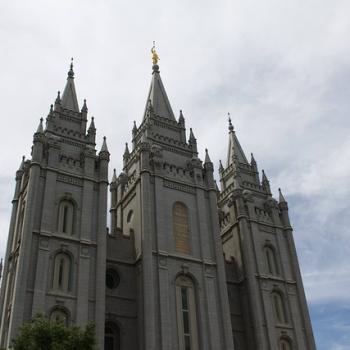DUANE’S QUESTION:
What do you think will happen to the Presbyterian Church (USA) now that it has voted to officially sanction gay marriage?
THE RELIGION GUY’S ANSWER:
Maybe not much. The Presbyterian Church (USA) announced March 17 that a nationwide referendum among regional bodies (“presbyteries”) has redefined marriage as “between two people, traditionally a man and woman” so same-sex couples can wed in church. This historic change will be very upsetting for a sizable minority but eruptions could be muted, for three reasons. First, some who consider Bible-based tradition a make-or-break conscience matter have already quit the PC(USA). Second, conservatives who remain risk loss of their properties if they leave.
And then dissenting clergy and congregations are told they won’t be forced to change their stand or conduct gay nuptials. But Carmen LaBerge, president of the conservative Presbyterian Lay Committee, is wary. “If this is a genuine justice issue” and the traditionalists are “discriminatory hatemongers” as liberals believe, she wonders how long the church can “limp along between two opinions…. That’s a lot of tension for an organization to endure for long.”
While Catholicism, Eastern Orthodoxy, and evangelical Protestantism are resolute in opposition, the PC(USA) becomes the second major U.S. Christian denomination to sanction same-sex marriages. In 2005 the United Church of Christ endorsed them for secular law and asked congregations to consider the same policy. The Episcopal Church is expected to redefine marriage at its June 25 – July 3 convention. The Evangelical Lutheran Church in America allows leeway and eventually may give gay marriage formal endorsement. However, the United Methodist Church has consistently upheld a conservative belief defined in the 1970s that’s unlikely to change at next year’s conference or beyond, though liberals persistently defy their church’s teaching.
For the troubled PC(USA), will this decision finally conclude an anguishing debate and bring some healing? Presbyterian struggles over sexual morality have ground away for 49 years now, in a classic saga of U.S. “mainline” Protestant theological change. To help follow things, keep in mind that the PC(USA) originated in 1983 with a merger of two bodies split by the Civil War, the southern “Presbyterian Church in the U.S.” and the larger and more liberal “United Presbyterian Church in the U.S.A.” covering the rest of the nation.
Our story begins in 1966 when the United Presbyterian Church, during revision of its over-all theological platform, launched a sexuality study and, the same year, published the attention-grabbing book “Situation Ethics: The New Morality.” A majority on the study panel leaned toward that book’s outlook and soft-pedaled traditional teachings on same-sex behavior and other matters. In 1970 the national church assembly received the panel’s report for study but tacked on an explicit conservative stance — by a mere 9-vote margin among 703 delegates.
The ensuing debate centered on two aspects, whether to allow partnered gay and lesbian clergy and, later, what to do about same-sex unions or marriages. Church tribunals were to become as important as voting assemblies in the struggle. Among key moments:
Another study panel, commissioned by the United Presbyterians’ 1976 assembly, proposed clergy ordination for “avowed practicing homosexuals,” but the 1978 assembly strongly rejected that idea. After the two denominations reunited, the 1987 assembly ordered yet another study that the 1991 assembly declined to adopt. The 1996 assembly sought to settle the dispute with a constitutional amendment mandating that clergy and lay officers (heterosexual and homosexual alike) observe “fidelity within the covenant of marriage between a man and a woman, or chastity in singleness.” The next year, 97 presbyteries ratified that policy vs. 74 opposed. In 2011, on the fourth try, the liberal side finally carried a referendum that abolished that policy.
On the question of gay couples, church tribunals eventually ruled in 2000 that congregations could offer same-sex ceremonies if they were not considered “marriage,” and conservative bids to overturn this failed. The 2012 assembly defeated a bill to redefine marriage but by only 52 percent of delegates. Last June’s assembly approved such a proposal by 71 percent, leading to the current referendum and result announced March 17.
During these years, Presbyterians have suffered one of the worst membership slides in American church history, from two denominations’ total of just over 4 million in the mid-1960s to the merged church’s current 1,760,000. Note that the never-ending gay debate is only one of several factors that provoked grass-roots distress and eroded church unity and dynamism. Yet the Louisville-based PC(USA) retains 10,038 local congregations and rich inherited assets including a $694 million endowment fund. See www.pcusa.org.
Over the years, some conservatives just drifted away as individuals. Others joined formal schisms and, typically for U.S. Protestants, not just one split but three occurred:
— The Presbyterian Church in America, based in Lawrenceville, Georgia, originated in 1973 when unhappy conservatives left the former “southern” denomination prior to any sexuality dispute. In 1982 the PCA merged with a conservative northern body and has posted impressive growth. It currently counts 1,494 congregations, 314 missions, and 367,000 members. Many who later left the PC(USA) didn’t join the PCA because of its rigorous Calvinism and bar against women clergy. www.pcanet.org.
— The Evangelical Presbyterian Church, based in Livonia, Michigan, was formed in 1981 and provided PC(USA) dropouts an alternative to the PCA. The EPC allows congregations local option on “non-essential issues” like women’s ordination and speaking in tongues as practiced in the charismatic movement. It reports 550 congregations. www.epc.org.
— More moderate conservatives stuck with the PC(USA) till the 2011 referendum loosened ordination standards. The next year they formed the Covenant Order of Evangelical Presbyterians or “ECO,” based in Goleta, California. More than the EPC, this group’s “core values” include “unleashing the ministry gifts of women.” So far this emerging alliance has attracted 187 congregations. www.eco-pres.org.
For more, see “Religion Q and A” item from 2013, “Same-sex marriage and U.S. religion”: www.patheos.com/blogs/religionqanda/2013/03/same-sex-marriage-and-u-s-religion










